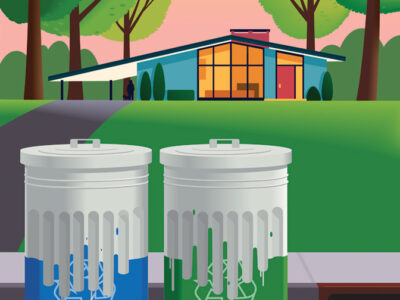
“I’m a longtime environmentalist, so I developed a certain amount of guilt over my pickup truck,” admits Dr. Karl Ulrich, professor and chair of Wharton’s Department of Operations and Information Management and faculty director of Weiss Tech House. “I use it to get to Vermont, so I need four-wheel drive,” he explains, but “it consumes a lot of energy and produces a lot of carbon-dioxide emissions.”
Ulrich was willing to pay a fee to undo the damage caused by his vehicle and suspected he was not alone. Together with 41 MBA students, he founded TerraPass, a for-profit group that counterbalances pollution from cars with reductions in industrial carbon emissions. TerraPass customers pay yearly dues—proportional to the amount of their cars’ emissions—that are then used to fund industrial energy-conservation projects.
Those curious about how much they contribute to global warming can go on www.terrapass.com and enter their car’s year, make, model, and annual mileage into the site’s calculator. After the amount of carbon dioxide produced has been determined, one of the four membership levels offered by TerraPass is suggested with the guarantee that the membership fee will “clean up after your car.”
Within two weeks of its launch in November 2004, TerraPass sold 149 memberships. A year later, there were about 2,000 drivers enrolled in TerraPass, with most of them in the $49.95 “standard” group for cars with an average fuel-efficiency of 19 to 28 miles per gallon.
TerraPass helps finance the use of windmills, which are a renewable energy source. It also uses its associate membership in the Chicago Climate Exchange (CCX) to spur industrial-efficiency projects. Companies registered with CCX agree to achieve annual reductions in their carbon-dioxide emissions either through increasing efficiency or by purchasing “exchange allowances” from other companies that reduced their emissions beyond targeted amounts. By purchasing exchange allowances within CCX, TerraPass makes fewer exchange allowances available to under-target companies and encourages efforts to increase efficiency.
In addition, TerraPass invests in greenhouse-gas abatement, funding projects that harness methane from farms and landfills as a form of clean energy and prevent it from reaching the atmosphere.
The company’s membership fees have prevented the release of 23 million pounds of CO2 into the atmosphere, and its influence, Ulrich believes, will continue to grow as it attracts more motorists.
Brendan Bell, the global warming expert of the Sierra Club, America’s oldest and largest grassroots environmental organization, believes TerraPass is a good idea and “one of the ways in which we can make a difference” when “a lot of leaders are dropping the ball” on environmental-protection issues. “TerraPass shows that people care about global warming, but we need to translate that [concern] into national policies,” he adds. “We want to get to a point where we don’t have to buy indulgences.”
—Chelsea Tanimura C’06




